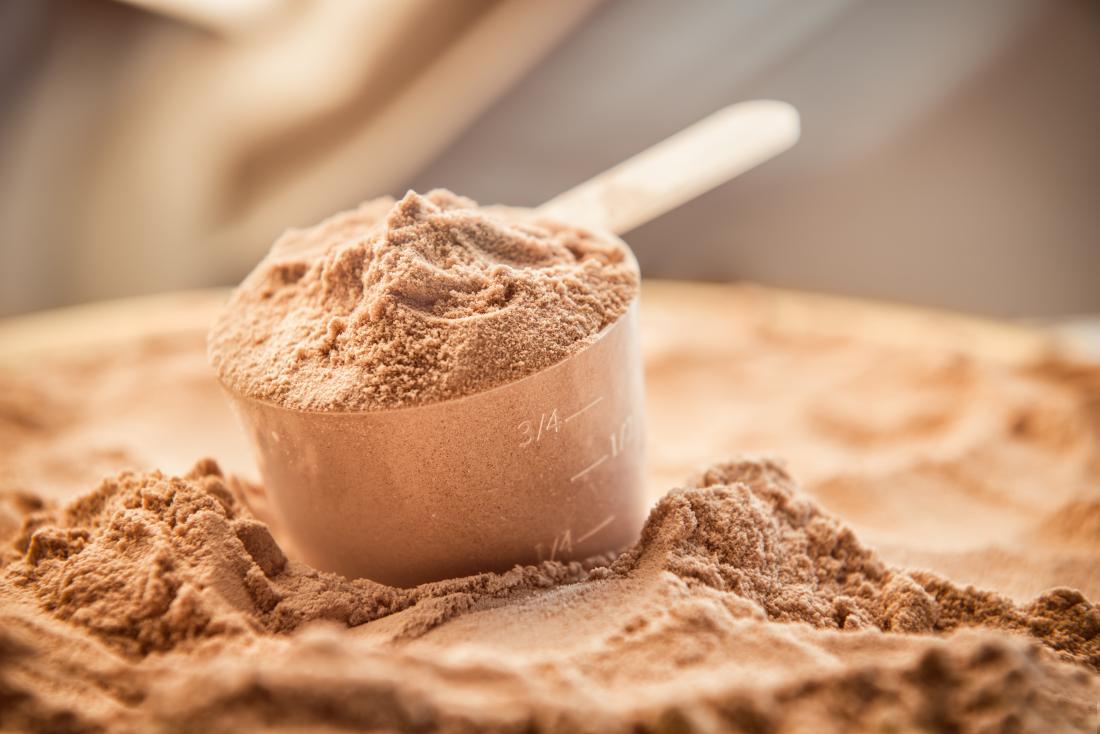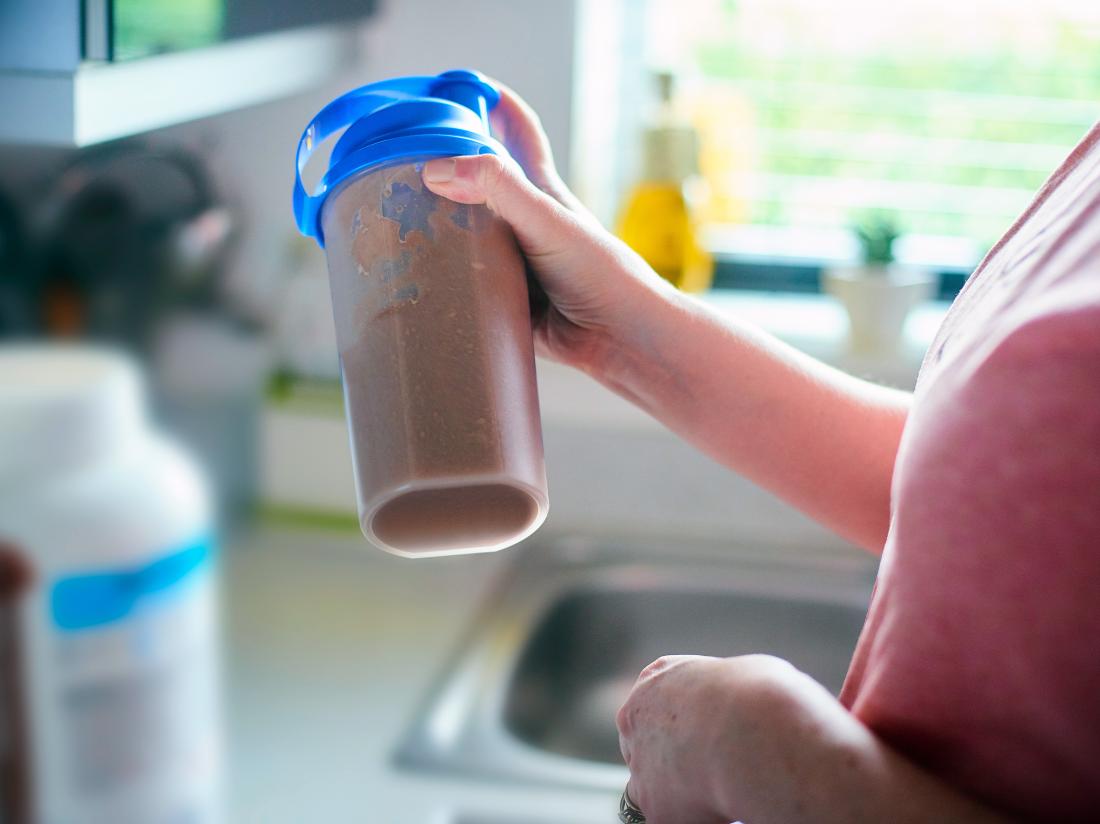A high protein diet can help a person build muscle mass, reduce appetite, and burn fat, which can lead to weight loss.
In addition, foods rich in protein help a person stay fuller for longer, compared with high fat or high carbohydrate foods.
Various types of protein powder are available, many of which are dairy- or plant-based.
Below, we compare the potential for different protein powders to aid weight loss, including powders suitable for vegetarians or vegans. We also describe how to incorporate these powders into the diet.
Whey protein
Whey protein can provide the body with amino acids.
Whey protein represents one of the most popular protein supplements.
Whey is a milk-based protein. It contains all of the amino acids that the body cannot produce on its own. Therefore, doctors refer to it as a “complete” protein. It may also support weight loss.
In a randomized clinical trial involving adults who were overweight or had obesity, participants who consumed whey protein drinks — without making any other dietary changes — experienced a reduction in body weight and body fat, compared with participants who had instead consumed supplementary carbohydrates.
The researchers also discovered that the participants who had consumed the whey protein had lower levels of the hunger hormone ghrelin and smaller waist circumferences at the end of the 23-week study period, compared with the other participants.
In addition, one review of studies found that participants who performed resistance training and who used whey protein were more likely to gain lean muscle mass and upper and lower body strength than those who did similar training but who did not receive whey supplementation.
Casein protein
Casein is another milk-based protein. It is also a complete protein.
The body absorbs casein more slowly than whey. Since the body digests casein at a slower rate, it may help keep a person fuller for longer. This prolonged feeling of fullness may help with weight loss.
However, one study comparing the effects of casein protein and whey protein found no significant differences between the two, in terms of energy expenditure or appetite regulation.
Egg white protein
For people who cannot tolerate dairy, egg white protein may be a good option.
While the yolk contains most of an egg’s vitamins and nutrients, egg whites are almost entirely made of protein. Egg white protein is also low in fat and carbohydrates.
However, a study published in Nutrition Journal suggests that egg white protein may be less effective than other proteins at decreasing appetite and supporting weight loss. Confirming this will require more research.
Collagen

Collagen may help build muscle mass if combined with resistance training.
Collagen is gaining popularity as a protein source and supplement. It may have several health benefits, including supporting skin health and — in mice — reducing effects of osteoarthritis.
Collagen protein is made up of the skin or bones of animals. It can quickly dissolve into liquid, and some people have it in their morning coffee.
Some research indicates that collagen supplements could help boost muscle mass.
One study found that collagen supplements, in conjunction with resistance training, led to higher levels of fat free body mass and muscle strength among male participants in their 60s or 70s. These participants all had sarcopenia, a condition characterized by the degeneration of skeletal muscle.
Soy protein
Soy protein is suitable for people who follow vegan or vegetarian diets, and it contains every essential amino acid, making it a complete protein source.
Research suggests that soy may provide modest health benefits because it contains isoflavones. Isoflavones are plant compounds that mimic estrogen and have antioxidant activity. Soybeans are a rich source of isoflavones, while soy products contain varying concentrations.
Soy may help relieve symptoms of menopause and offer some protection against breast cancer and heart disease. Also, soy may support weight loss and a reduction in body fat.
One study in postmenopausal female participants found that a group who consumed a daily soy supplement had less abdominal fat and overall body fat at the end of the 3-month trial, compared with a placebo group.
Brown rice protein
Brown rice protein is another option for people who do not consume dairy or other animal products.
However, it is not a complete source, so a person should be supplementing their protein intake with other sources.
Some research suggests that brown rice protein may be beneficial for people looking to increase muscle mass.
In a small study that included 24 college-aged, resistance-trained male participants, rice protein helped improve perceived recovery from exercise and reduce muscle soreness as effectively as whey protein. Also, both the rice and whey protein groups experienced similar increases in strength, power, muscle mass, and lean body mass.
How to use them

A person can try adding protein powder to a number of foods and liquids.
Protein powders can be a convenient way to boost a person’s protein intake.
The International Society of Sports Nutrition recommend a daily intake of 1.4–2.0 grams of protein per kilogram of body weight for most healthy people who exercise.
This much protein will help with building and maintaining muscle mass, while athletes and other people who train regularly may need more protein.
Most studies so far indicate that a person receives the most benefit from protein when they consume it right before or right after exercise. However, confirming this requires further research.
There are many ways to incorporate protein powder into the diet.
For weight loss purposes, a person could use a protein supplement as a replacement for a meal. The goal would be to create a calorie deficit, in which a person expends more calories than they take in.
It is important to note, however, that doctors do not recommend replacing meals with protein shakes in the long term. These shakes do not provide the nutritional benefits of whole foods.
The most beneficial way to lose weight is through a healthful, balanced diet and regular physical activity.
To make a protein shake, a person could mix the powder with water or milk, or blend it with ice or fruit.
Other ways to use protein powder include:
- adding it to baked goods, such as bread or muffins
- adding it to pancake or waffle mix
- adding it to yogurt or oatmeal
- combining it with oats, nut butter, fruit, or a combination to make energy bars or balls
Takeaway
Research suggests that a high protein intake may aid in weight loss. Protein can help control appetite and build muscle mass.
Protein powders can be an easy and convenient way to boost the intake of protein, and many types are available.
However, some protein powders do not contain all of the essential amino acids, which means that a person should also be consuming protein from other sources.
A doctor or a dietician can help ensure that a person is receiving the right amount of protein to suit their needs.
